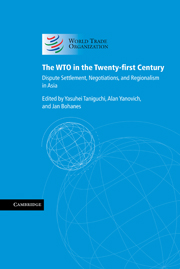Book contents
- Frontmatter
- Contents
- Notes on contributors
- Acknowledgements
- Table of dispute settlement cases and reports
- List of abbreviations
- Introduction
- PART I The WTO at Ten
- PART II Accomplishments and Future Prospects of the WTO Dispute Settlement System
- PART III Asian Perspectives on WTO Dispute Settlement
- 11 East Asia in the WTO dispute settlement mechanism
- 12 Japan's perspectives on the present Dispute Settlement Understanding negotiations
- 13 A review of some appellate decisions: law, policy, and economics in dispute settlement
- 14 Is the WTO dispute settlement mechanism important to business?
- 15 Japan's approach to the ‘use’ of the WTO: how can we achieve an effective link between business and the WTO?
- PART IV The Doha Development Agenda and Beyond
- PART V Asian Regional Integration and the Multilateral Trading System
- Index
11 - East Asia in the WTO dispute settlement mechanism
from PART III - Asian Perspectives on WTO Dispute Settlement
Published online by Cambridge University Press: 05 March 2012
- Frontmatter
- Contents
- Notes on contributors
- Acknowledgements
- Table of dispute settlement cases and reports
- List of abbreviations
- Introduction
- PART I The WTO at Ten
- PART II Accomplishments and Future Prospects of the WTO Dispute Settlement System
- PART III Asian Perspectives on WTO Dispute Settlement
- 11 East Asia in the WTO dispute settlement mechanism
- 12 Japan's perspectives on the present Dispute Settlement Understanding negotiations
- 13 A review of some appellate decisions: law, policy, and economics in dispute settlement
- 14 Is the WTO dispute settlement mechanism important to business?
- 15 Japan's approach to the ‘use’ of the WTO: how can we achieve an effective link between business and the WTO?
- PART IV The Doha Development Agenda and Beyond
- PART V Asian Regional Integration and the Multilateral Trading System
- Index
Summary
In Part II of this book, the authors discuss the accomplishments and future challenges facing the World Trade Organization (WTO) and its dispute settlement mechanism. In this chapter, I present my observations on the subject of East Asian participation in the dispute settlement mechanism of the WTO. By East Asia, I mean the region encompassing the five WTO Members of Northeast Asia (that is, Japan, China, Korea, Chinese Taipei, and Hong Kong, China) and the ten countries of the Association of Southeast Asian Nations (ASEAN) (namely, Brunei Darussalam, Cambodia, Indonesia, Laos, Malaysia, Myanmar, the Philippines, Singapore, Thailand, and Viet Nam). As most countries in this region were latecomers to the multilateral trading system, their participation in the General Agreement on Tariffs and Trade (GATT) and its dispute settlement system was marginal. Their role in the WTO has increased considerably in all aspects of its work, including in its strengthened dispute settlement system. As most of the countries in East Asia are now WTO Members, their participation in the dispute settlement mechanism is likely to expand in the future.
In the GATT, East Asian Contracting Parties, except Japan, had limited participation in the dispute settlement system. They were involved more as respondents than as complainants. Only two East Asian countries other than Japan were involved in GATT dispute cases. Thailand had two disputes with the United States concerning tobacco, one in which Thailand was a complainant and the other in which it was a respondent.
- Type
- Chapter
- Information
- The WTO in the Twenty-first CenturyDispute Settlement, Negotiations, and Regionalism in Asia, pp. 261 - 266Publisher: Cambridge University PressPrint publication year: 2007



